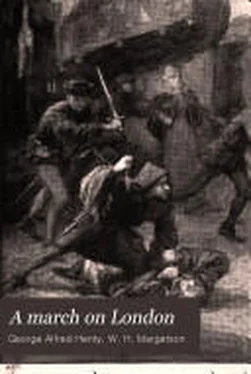“Here there is no such feeling. It is against the government that taxes them so heavily that their anger is directed, and I fear that this new poll-tax that has been ordered will drive them to extremities. I have news that across the river in Essex the people of some places have not only refused to pay, but have forcibly driven away the tax-gatherers, and when these things once begin, there is no saying how they are going to end. However, if there is trouble, I think not that at first we shall be in any danger here, but if they have success at first their pretensions will grow. They will inflame themselves. The love of plunder will take the place of their reasonable objections to over-taxation, and seeing that they have but to stretch out their hands to take what they desire, plunder and rapine will become general.”
As Edgar walked back home he felt that there was much truth in the Prior's remarks. He himself had heard many things said among the villagers which showed that their patience was well-nigh at an end. Although, since he began his studies, he had no time to keep up his former close connection with the village, he had always been on friendly terms with his old playmates, and they talked far more freely with him than they would do to anyone else of gentle blood. Once or twice he had, from a spirit of adventure, gone with them to meetings that were held after dark in a quiet spot near Dartford, and listened to the talk of strangers from Gravesend and other places. He knew himself how heavily the taxation pressed upon the people, and his sympathies were wholly with them. There had been nothing said even by the most violent of the speakers to offend him. The protests were against the exactions of the tax-gatherers, the extravagance of the court, and the hardship that men should be serfs on the land.
Once they had been addressed by a secular priest from the other side of the river, who had asserted that all men were born equal and had equal rights. This sentiment had been loudly applauded, but he himself had sense enough to see that it was contrary to fact, and that men were not born equal. One was the son of a noble, the other of a serf. One child was a cripple and a weakling from its birth, another strong and lusty. One was well-nigh a fool, and another clear-headed. It seemed to him that there were and must be differences.
Many of the secular clergy were among the foremost in stirring up the people. They themselves smarted under their disabilities. For the most part they were what were called hedge priests, men of but little or no education, looked down upon by the regular clergy, and almost wholly dependant on the contributions of their hearers. They resented the difference between themselves and the richly endowed clergy and religious houses, and denounced the priests and monks as drones who sucked the life- blood of the country.
This was the last gathering at which Edgar had been present. He had been both shocked and offended at the preaching. What was the name of the priest he knew not, nor did the villagers, but he went by the name of Jack Straw, and was, Edgar thought, a dangerous fellow. The lad had no objection to his abuse of the tax-gatherers, or to his complaints of the extravagance of the court, but this man's denunciation of the monks and clergy at once shocked and angered him. Edgar's intercourse with the villagers had removed some of the prejudices generally felt by his class, but in other respects he naturally felt as did others of his station, and he resolved to go to no more meetings.
After taking his meal with his father, Edgar mounted the horse that the latter had bought for him, and rode over to the house of one of his friends.
The number of those who had, like himself, been taught by the monk of St. Alwyth had increased somewhat, and there were, when he left, six other lads there. Three of these were intended for the Church. All were sons of neighbouring landowners, and it was to visit Albert de Courcy, the son of Sir Ralph de Courcy, that Edgar was now riding. Albert and he had been special friends. They were about the same age, but of very different dispositions. The difference between their characters was perhaps the chief attraction that had drawn them to each other. Albert was gentle in disposition, his health was not good, and he had been a weakly child. His father, who was a stout knight, regarded him with slight favour, and had acceded willingly to his desire to enter the Church, feeling that he would never make a good fighter.
Edgar, on the contrary, was tall and strongly built, and had never known a day's illness. He was somewhat grave in manner, for the companionship of his father and the character of their conversations had made him older and more thoughtful than most lads of his age. He was eager for adventure, and burned for an opportunity to distinguish himself, while his enthusiasm for noble exploits and great commanders interested his quiet friend, who had the power of admiring things that he could not hope to imitate. In him, alone of his school-fellows, did Edgar find any sympathy with his own feelings as to the condition of the people. Henry Nevil laughed to scorn Edgar's advocacy of their cause. Richard Clairvaux more than once quarrelled with him seriously, and on one or two occasions they almost betook themselves to their swords. The other three, who were of less spirit, took no part in these arguments, saying that these things did not concern them, being matters for the king and his ministers, and of no interest whatever to them.
In other respects Edgar was popular with them all. His strength and his skill in arms gave him an authority that even Richard Clairvaux acknowledged in his cooler moments. Edgar visited at the houses of all their fathers, his father encouraging him to do so, as he thought that association with his equals would be a great advantage to him. As far as manners were concerned, however, the others, with the exception of Albert de Courcy, who did not need it, gained more than he did, for Mr. Ormskirk had, during his long residence at foreign universities and his close connection with professors, acquired a certain foreign courtliness of bearing that was in strong contrast to the rough bluffness of speech and manner that characterized the English of that period, and had some share in rendering them so unpopular upon the Continent, where, although their strength and fighting power made them respected, they were regarded as island bears, and their manners were a standing jest among the frivolous nobles of the Court of France.
At the house of Sir Ralph de Courcy Edgar was a special favourite. Lady de Courcy was fond of him because her son was never tired of singing his praises, and because she saw that his friendship was really a benefit to the somewhat dreamy boy. Aline, a girl of fourteen, regarded him with admiration; she was deeply attached to her brother, and believed implicitly his assertion that Edgar would some day become a valiant knight; while Sir Ralph himself liked him both for the courtesy of his bearing and the firmness and steadiness of his character, which had, he saw, a very beneficial influence over that of Albert. Sir Ralph was now content that the latter should enter the Church, but he was unwilling that his son should become what he called a mere shaveling, and desired that he should attain power and position in his profession.
The lack of ambition and energy in his son were a grievance to him almost as great as his lack of physical powers, and he saw that although, so far there was still an absence of ambition, yet the boy had gained firmness and decision from the influence of his friend, and that he was far more likely to attain eminence in the Church than he had been before. He was himself surprised that the son of a man whose pursuits he despised should have attained such proficiency with his weapons—a matter which he had learned, when one day he had tried his skill with Edgar in a bout with swords—and he recognized that with his gifts of manner, strength and enthusiasm for deeds of arms, he was likely one day to make a name for himself.
Читать дальше












